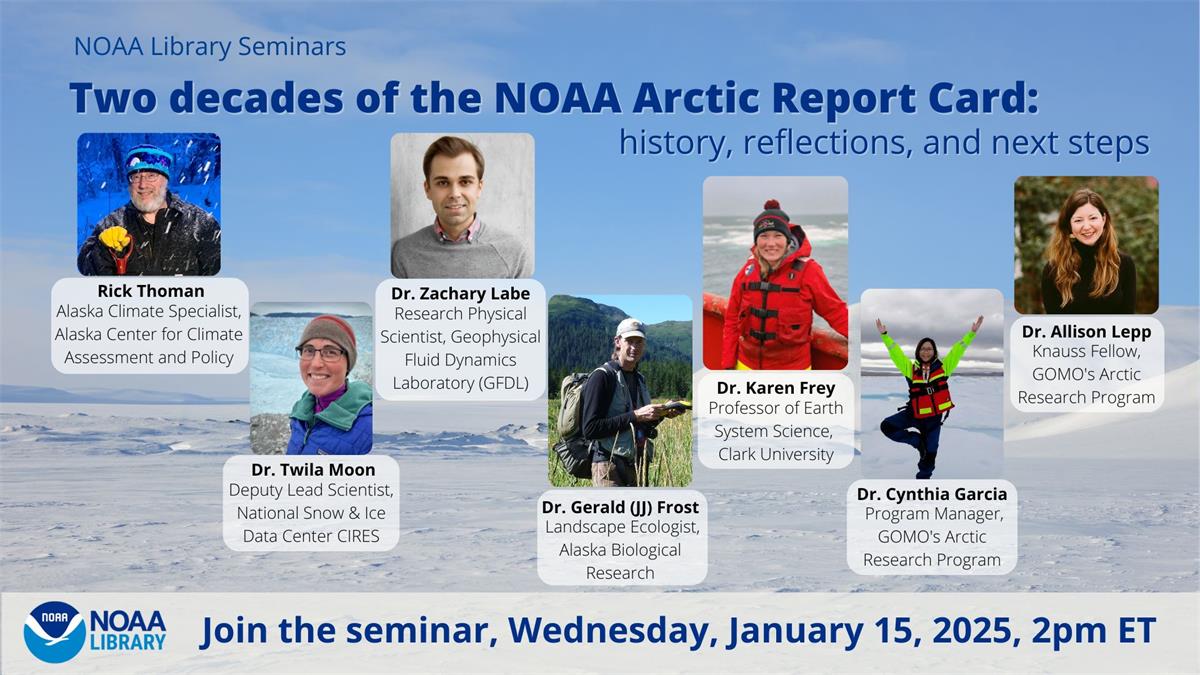
Date: January 15, 2025 | 2-3 PM ET
Register to attend: https://vimeo.com/event/4772033
Speakers: Rick Thoman, Alaska Climate Specialist, Alaska Center for Climate Assessment and Policy, International Arctic Research Center/University of Alaska Fairbanks; Dr. Twila Moon, Deputy Lead Scientist & Science Communication Liaison National Snow & Ice Data Center CIRES, University of Colorado, Boulder; Dr. Zachary Labe, Research Physical Scientist (NOAA Federal), Seasonal-to-Decadal Variability and Predictability Division, Geophysical Fluid Dynamics Laboratory (GFDL); Dr. Gerald (JJ) Frost, landscape ecologist, Alaska Biological Research; Dr. Karen Frey, Professor, Clark University; Dr. Cynthia Garcia, Program Manager, GOMO's Arctic Research Program; Dr. Allison Lepp, Knauss Fellow, GOMO's Arctic Research Program
Seminar Contacts: library.seminars@noaa.gov, and heather.heenehan@noaa.gov
Abstract: This year marks the 20th anniversary of the Arctic Report Card (ARC), an annual NOAA product developed in collaboration with leading Arctic researchers and Indigenous experts that summarizes the state of the Arctic ecosystem compared to historical records. This webinar will cover an ARC history and feature a panel of experts, each of whom have served as ARC authors or editors for 4+ year terms. They will reflect on how Arctic science and ecosystems have evolved over the past 20 years. NOAA's coordinating editor of the ARC will offer a forward-looking perspective, announce exciting new features, and discuss how to engage in the ARC process.
Keywords: arctic, collaboration, product
About the Speakers: Rick Thoman is an expert in Alaska climate and weather. He produces reliable Alaska climate change information and graphics describing Alaska's changing environment. His work spans the bridge between climate modeling, Alaska communities and media.
Dr. Twila Moon is Deputy Lead Scientist and Science Communication Liaison at the National Snow and Ice Data Center, part of the University of Colorado Boulder's Cooperative Institute for Research in Environmental Sciences (CIRES). Her research focuses on Greenland and the Arctic and has been published in high-impact journals such as Science and Nature. Dr. Moon has testified for the U.S. Congress, serves on the U.S. Polar Research Board, and spearheads efforts to improve knowledge exchange amongst researchers and with decision makers and the public.
Zack Labe is a research scientist at the NOAA Geophysical Fluid Dynamics Lab in Princeton, New Jersey. His current work explores the intersection of large-scale climate variability and change, extreme events, large ensembles, decadal prediction, and data science methods. In addition to academic research, He is very passionate about improving science communication, accessibility, and outreach through engaging data visualizations.
JJ Frost is a landscape ecologist with a multidisciplinary research background focused on boreal forest and Arctic tundra ecosystems. JJ is based at Alaska Biological Research, Inc. in Fairbanks, Alaska and has over 26 years of field experience in Alaska and northwestern Siberia. His work integrates field measurements with a variety of modern and historical remote-sensing datasets to understand current ecosystem conditions and long-term changes involving vegetation and permafrost.
Dr. Karen Frey is a professor of earth system science in the Graduate School of Geography at Clark University. Dr. Frey's most recent work focuses on the biological and biogeochemical impacts of sea ice decline in polar shelf environments as well as the hydrological and biogeochemical impacts of terrestrial permafrost degradation across the Arctic. Over the past 25 years, she has conducted field-based research in West and East Siberia, the North Slope of Alaska, as well as the Bering, Chukchi, and Beaufort Seas.
Cindy is a Program Manager for GOMO's Arctic Research Program (ARP), specializing in sea ice observations and data management, and is the coordinating editor of the NOAA Arctic Report Card. Cynthia was a 2022 Knauss Marine Policy Fellow with the ARP and has a Ph.D. in Earth and Environmental Sciences from the University of Illinois, Chicago. Her research focuses on understanding biogeochemical changes along marginal ice zones and coastal margins of our planet using satellite-derived measurements.
Alie is a Knauss Fellow in GOMO's Arctic Research Program. A significant portion of her fellowship year has focused on communications - telling the story of why Arctic changes are important no matter where you live to a variety of audiences, including Congress, NOAA leadership, and the general public. For her PhD and Master's work, Alie used marine geological archives from the Antarctic continental shelf to reconstruct glacial and oceanographic processes across timescales to better understand ice-sheet sensitivity and dynamics.
Sponsors: NOAA Library and The Arctic Research Program
Accessibility: Captions are available during the live presentation and once uploaded to the NOAA Library YouTube Channel automatic captions are added. Sign language interpreting services and closed captioning are available, but need to be requested at least 5 days before the event.
Recordings: Recordings will be shared 24 hours after the event on the NOAA Library YouTube channel.
------------------------------
Heather Heenehan
Education and Outreach Specialist
UCAR, and NOAA, GOMO
------------------------------